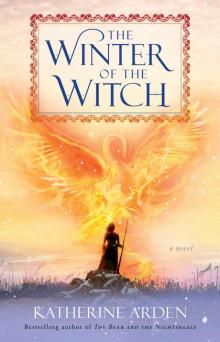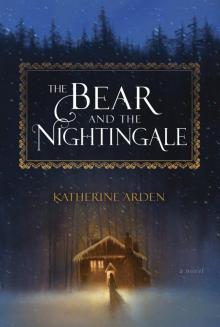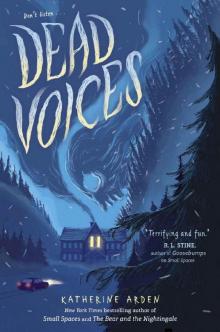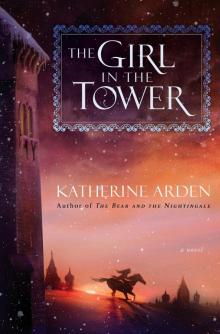- Home
- Katherine Arden
The Bear and the Nightingale Page 3
The Bear and the Nightingale Read online
Page 3
“What goings-on, Dunya?” Sasha inquired. He had come into the kitchen in time to hear the tirade.
“Vasya,” said Olga succinctly, and told the story of the honeycakes and her sister’s escape into the forest. As she talked, she knitted. The faintest of rueful smiles dimpled her mouth. She was still fat with summer’s bounty, round-faced and lovely.
Sasha laughed. “Well, Vasya will come back when she gets hungry,” he said, and turned to more important matters. “Is that pike in the stew, Dunya?”
“Tench,” said Dunya shortly. “Oleg brought four at dawn. But that strange sister of yours is too small to linger in the woods.”
Sasha and Olga looked at each other, shrugged, and said nothing. Vasya had been disappearing into the forest ever since she could walk. She would come back in time for dinner, as always, bearing a handful of pine-nuts in apology, flushed and repentant, catlike on her booted feet.
But in this case they were wrong. The brittle sun slipped across the sky, and the shadows of the trees stretched monstrously long. At last Pyotr Vladimirovich himself came into the house, bearing a hen-pheasant by its broken neck. Still Vasya had not come back.
THE FOREST WAS QUIET on the cusp of winter, the snow thicker between the trees. Vasilisa Petrovna, half-ashamed and half-pleased with her freedom, ate her last half honeycake stretched out on the cold limb of a tree, listening to the soft noises of the drowsing forest. “I know you sleep when the snow comes,” she said aloud. “But couldn’t you wake up? See, I have cakes.”
She held out the evidence, now little more than crumbs, and paused as though expecting a reply. But none came, beyond a soft, rattling wind that stirred all the trees together.
So Vasya shrugged, dabbed up the crumbs of her honeycake, and ran about the wood awhile, looking for pine-nuts. The squirrels had eaten them all, though, and the forest was cold, even to a girl born to it. At last, Vasya brushed the ice and bark from her clothes and set her feet for home, finally feeling the pricking of conscience. The forest was thick with shade; the shortening days slid rapidly to night, and she hurried. She would get a thundering scold, but Dunya would have dinner waiting.
On and on she went, and then paused, frowning. Left at the gray alder, round the wicked old elm, and then she would see her father’s fields. She had walked that path a thousand times. But now there was no alder and no elm, only a cluster of black-needled spruces and a little snowy meadow. Vasya swung round, tried a new direction. No, here were slender beeches, standing white as maidens, naked with winter and trembling. Vasya was suddenly uneasy. She could not be lost; she was never lost. Might as well be lost in her own house as lost in the woods. A wind picked up that set all the trees to shaking, but now they were trees she did not know.
Lost, Vasya thought. She was lost in the dusk on the cusp of winter and it was going to snow. She turned again, tried another direction. But in that wavering wood, there was not one tree she knew. The tears welled suddenly in her eyes. Lost, I am lost. She wanted Olya or Dunya; she wanted her father and Sasha. She wanted her soup and her blanket and even her mending.
An oak-tree loomed in her way. The child stopped. This tree was not like the others. It was bigger and blacker and gnarled like a wicked old woman. The wind shook its great black branches.
Vasya, beginning to shiver, crept toward it. She laid a hand on the bark. It was like any other tree, rough and cold even through the fur of her mitten. Vasya stepped around it, craning up at the branches. Then she looked down and nearly tripped.
A man lay curled like a beast at the foot of this tree, fast asleep. She could not see his face; it was hidden between his arms. Through rents in his clothes, she glimpsed cold white skin. He did not stir at her approach.
Well, he could not lie there sleeping, not with snow coming out of the south. He would die. And perhaps he knew where her father’s house lay. Vasya reached out to shake him awake but thought better of it. Instead, she said, “Grandfather, wake up! There will be snow before moonrise. Wake up!”
For long moments, the man did not stir. But just when Vasya was nerving herself to lay a hand on his shoulder, there came a snuffling grunt, and the man raised his face and blinked one eye at her.
The child recoiled. One side of his face was fair, in a rough-hewn way. One eye was gray. But the other eye was missing, the socket sewn shut, and that side of his face a mass of bluish scars.
The good eye blinked sulkily at the girl, and the man sat back on his haunches as though to see her better. He was a thin creature, ragged and filthy. Vasya could see his ribs through the rents in his shirt. But when he spoke, his voice was strong and deep.
“Well,” he said. “It is a long time since I have seen a Russian girl.”
Vasya did not understand. “Do you know where we are?” she said. “I am lost. My father is Pyotr Vladimirovich. If you can take me home, he will see you fed, and give you a place beside the oven. It is going to snow.”
The one-eyed man smiled suddenly. He had two dog-teeth, longer than the rest, that dented his lip when he smiled. He came to his feet, and Vasya saw that he was a tall man with big, crude bones. “Do I know where we are?” he said. “Well, of course, devochka, little maiden. I’ll take you home. But you must come here and help me.”
Vasya, spoiled since she could remember, had no particular reason to be untrusting. Yet she did not stir.
The gray eye narrowed. “What manner of girl-child comes here, all alone?” And then, softer, “Such eyes. Almost I remember…Well, come here.” He made his voice coaxing. “Your father will be worried.”
He bent his gray eye upon her. Vasya, frowning, took a small step toward him. Then another. He put out a hand.
Suddenly there came the crunch of hooves in the snow, and the snorting breaths of a horse. The one-eyed man recoiled. The child stumbled backward, away from his outstretched hand, and the man fell to the earth, cringing. A horse and rider stepped into the clearing. The horse was white and strong; when her rider slid to the ground, Vasya saw that he was slender and bold-boned, the skin drawn tight over cheek and throat. He wore a rich robe of heavy fur, and his eyes gleamed blue.
“What is this?” he said.
The ragged man cringed. “No concern of yours,” he said. “She came to me—she is mine.”
The newcomer turned a clear, cold look on him. His voice filled the clearing. “Is she? Sleep, Medved, for it is winter.”
And even as the sleeper protested, he sank once more to his place between the oak-roots. The gray eye filmed over.
The rider turned on Vasya. The child edged backward, poised on the edge of flight. “How came you here, devochka?” said this man. He spoke with swift authority.
Tears of confusion spilled down Vasya’s cheeks. The one-eyed man’s avid face had frightened her, and this man’s fierce urgency frightened her, too. But something in his glance silenced her weeping. She lifted her eyes to his face. “I am Vasilisa Petrovna,” she said. “My father is lord of Lesnaya Zemlya.”
They looked at each other for a moment. And then Vasya’s brief courage was gone; she spun and bolted. The stranger made no attempt to follow. But he did turn to his horse when the mare came up beside him. The two exchanged a long look.
“He is getting stronger,” said the man.
The mare flicked an ear.
Her rider did not speak again, but glanced once more in the direction the child had taken.
OUT FROM THE SHADOW of the oak, Vasya was startled by how fast night had fallen. Beneath the tree, it had been indeterminate dusk, but now it was night, woolly night on the cusp of snow, the air all dour with it. The wood was full of torches and the desperate shouts of men. Vasya cared nothing for them; she recognized the trees again, and she wanted only Olga’s arms, and Dunya’s.
A horse came galloping out of the night, whose rider bore no torch. The mare saw the child an instant before her rider did, and skidded to a halt, rearing. Vasya tumbled to one side, skinning her hand. She thrust a fist into her
mouth to muffle her cry. The rider muttered imprecations in a voice she knew, and the next instant, she was caught up in her brother’s arms. “Sashka,” sobbed Vasya, burying her face against his neck. “I was lost. There was a man in the forest. Two men. And a white horse, and a black tree, and I was afraid.”
“What men?” demanded Sasha. “Where, child? Are you hurt?” He put her away from him and felt her over.
“No,” quavered Vasya. “No—I am only cold.”
Sasha said nothing; she could tell he was angry, though he was gentle when he put her on his mare. He swung up behind and wrapped her in a fold of his cloak. Vasya, safe, with her cheek against the well-tended leather of his sword-belt, slowly ceased her weeping.
Ordinarily Sasha tolerated his small sister following him about, trying to lift his sword or pluck the string of his bow. He indulged her, even, giving her a stump of candle, or a handful of hazelnuts. But now fear had made him furious and he did not speak to her as they rode.
He shouted left and right, and slowly word of Vasya’s rescue passed among the men. If she had not been found before the snow came, she would have died in the night, and only been discovered when the spring came to loosen her shroud—if she was found at all.
“Dura,” growled Sasha at last, when he had done shouting, “little fool, what possessed you? Running from Olga, hiding in the woods? Did you think yourself a wood-sprite, or forget the season?”
Vasya shook her head. She was shivering in hard spurts now. Her teeth clattered together. “I wanted to eat my cake,” she said. “But I got lost. I couldn’t find the elm-stump. I met a man at the oak-tree. Two men. And a horse. And then it was dark.”
Sasha frowned over her head. “Tell me of this oak-tree,” he said.
“An old one,” said Vasya. “With roots about its knees. And one-eyed. The man, not the tree.” She shivered harder than ever.
“Well, do not think of it now,” said Sasha, and urged on his tired horse.
Olga and Dunya met him at the threshold. The good old lady had tears all over her face and Olga was white as a frost-maiden in a fairy tale. They had raked all the coals out of the oven, and they poured water on the hot stones to make steam. Vasya found herself unceremoniously stripped and shoved into the oven-mouth to warm.
The scolding began as soon as she was out.
“Stealing cakes,” said Dunya. “Running away from your sister. How could you frighten us so, Vasochka?” She wept as she said it.
Vasya, heavy-eyed and repentant, murmured, “I’m sorry, Dunya. Sorry, sorry.”
She was rubbed with horrible mustard-seed, and beaten with quick, whisking birch-branches, to liven her blood. They wrapped her in wool, bandaged her skinned hand, and poured soup down her throat.
“It was very wicked, Vasya,” Olga said. She smoothed her sister’s hair and cradled her on her lap. Vasya was already asleep.
“Enough for tonight, Dunya,” Olga added. “Tomorrow is soon enough for more talk.”
Vasya was put to bed atop the oven, and Dunya lay down beside her.
When at last her sister slept, Olga sank down limp beside the fire. Her father and brothers sat spooning up their stew in a corner, wearing identical thunderous expressions. “She’ll be all right,” said Olga. “I do not think she’ll take a chill.”
“But any man might, who was called from his hearth to look for her,” snapped Pyotr.
“Or I might,” said Kolya. “A man wants his dinner after a day of mending his father’s roof, not a night’s ride by torchlight. I’ll belt her tomorrow.”
“And so?” retorted Sasha coolly. “She’s been belted before. It is not the task of men to manage girl-children. It wants a woman. Dunya is old. Olya will marry soon, and then the old lady will be left alone to raise the child.”
Pyotr said nothing. Six years since he put his wife in the earth, and he had not thought of another, though there were many who would have heard his suit. But his daughter had frightened him.
When Kolya had sought his bed, and he and Sasha sat together in the dark, watching the candle burn low before the icon, Pyotr said, “Would you see your mother forgotten?”
“Vasya never knew her,” rejoined Sasha. “But a woman of sense—not a sister or a kindly old nurse—would do her good. She will soon be unmanageable, Father.”
A long pause.
“It is not Vasya’s fault Mother died,” added Sasha, lower.
Pyotr said nothing, and Sasha rose, bowed to his father, and blew out the candle.
Pyotr thrashed his daughter the next day, and she wept, though he was not cruel. She was forbidden to leave the village, but for once, that was no hardship. She had taken the threatened chill, and she had nightmares in which she revisited a one-eyed man, a horse, and a stranger in a clearing in the woods.
Sasha, though he told no one, ranged the forest to the west, looking for this one-eyed man, or an oak-tree with roots about its knees. But never man nor tree did he find, and then the snow fell for three days, straight and hard, so that none went out.
Their lives drew in, as always in the winter, a round of food and sleep and small drowsy chores. The snow mounded up outside, and on a bitter evening Pyotr sat on his own stool, smoothing a straight piece of ash for an ax-handle. His face was set like stone, for he was remembering what he had pleased to forget. Take care of her, Marina had said, so many years ago, as the tinge of mortal illness spread over her lovely face. I chose her, she is important. Petya, promise me.
Pyotr, grieving, had promised. But then his wife had let go his hand, had lain back in her bed, and her eyes had looked beyond him. She smiled once, soft and joyful, but Pyotr did not think the look was for him. She did not speak again and died in the gray hour before dawn.
And then, Pyotr thought. They made ready a hole to receive her, and I bellowed at the women who tried to bar me from the death-chamber. I myself—I wrapped her cold flesh, that stank still of blood, and with my own two hands put her in the ground.
All that winter his infant daughter had screamed, and he could not bear to look the baby in the face, because her mother had chosen the child and not him.
Well, now he must make amends.
Pyotr squinted at his ax-handle. “I am going to Moscow when the rivers freeze,” he said into the silence.
The room erupted in exclamations. Vasya, who had been drowsing, heavy with fever and hot honey-wine, squeaked and poked her head over the side of the oven.
“To Moscow, Father?” asked Kolya. “Again?”
Pyotr’s lips thinned. He had gone to Moscow in that first, bitter winter after Marina’s death. Ivan Ivanovich, Marina’s half brother, was Grand Prince, and for his family’s sake, Pyotr had salvaged what he could of their connection. But he had taken no woman, then or later.
“You mean to marry this time,” said Sasha.
Pyotr nodded curtly, feeling the weight of his family’s stare. There were women enough in the provinces, but a Muscovite lady would bring alliances and money. Ivan’s indulgence for the husband of his dead sister would not last forever. And, for his small daughter’s sake, he needed a new wife. But…Marina, what a fool I am, to think I cannot bear it.
“Sasha and Kolya, you will come with me,” Pyotr said.
Delight quite overspread the censure on his sons’ faces. “To Moscow, Father?” asked Kolya.
“It is two weeks’ riding if all goes well,” said Pyotr. “I will need you on the road. And you have never been to court. The Grand Prince ought to know your faces.”
There was chaos in the kitchen then, as the boys exchanged delighted exclamations. Vasya and Alyosha both clamored to go. Olga begged for jewels and good cloth. The elder boys retorted gloatingly, and in arguing, pleading, and speculation, the evening passed.
THE SNOW FELL THRICE, deep and solid, after midwinter, and after the last snowfall came a great blue frost, when men felt their breath stop in their nostrils and weak things grew apt to die in the night. That meant the sledge-roads were open
, the roads that ran down snow-covered rivers smooth as glass and sparkled over dirt tracks that in summer were a misery of ruts and broken axles. The boys watched the sky and felt of the frost and took to pacing the house, oiling their greasy boots and scraping the hair-fine edges of their spears.
At last the day came. Pyotr and his sons rose in the dark and spilled into the dooryard as soon as it grew light. The men were gathered already. The keen dawn reddened their faces; their beasts stamped and snorted clouds of steam. A man had saddled Buran, Pyotr’s evil-tempered Mongol stallion, and was clinging, white-knuckled, to the beast’s headstall. Pyotr slapped his waiting mount, dodged the snapping teeth, and swung into the saddle. His grateful attendant fell back, gasping.
Pyotr kept half an eye on his unpredictable stallion; the rest was for the seeming chaos around him.
The stable-yard seethed with bodies, with beasts, with sledges. Furs lay mounded beside boxes of beeswax and candles. The jars of mead and honey jostled for room with bundles of dried provisions. Kolya was directing the loading of the last sledge, his nose red in the morning chill. He had his mother’s black eyes; the serving-girls giggled as he passed.
A basket fell with a thud and a puff of dry snow, almost under the feet of a sledge-horse. The beast shied forward and sideways. Kolya sprang out of the way, and Pyotr started forward, but Sasha was before them. He was off his mare like a cat, and next instant had caught the horse by its headstall, talking into its ear. The horse stilled, looking abashed. Pyotr watched as Sasha pointed, said something. The men hurried to take the horse’s rein and seize the offending basket. Sasha said something else, grinning, and they all laughed. The boy remounted his mare. His seat was better than his brother’s; he had an affinity for horses, and he bore his sword with grace. A warrior born, thought Pyotr, and a leader of men; Marina, I am fortunate in my sons.

 The Winter of the Witch
The Winter of the Witch The Bear and the Nightingale
The Bear and the Nightingale Dead Voices
Dead Voices The Girl in the Tower
The Girl in the Tower